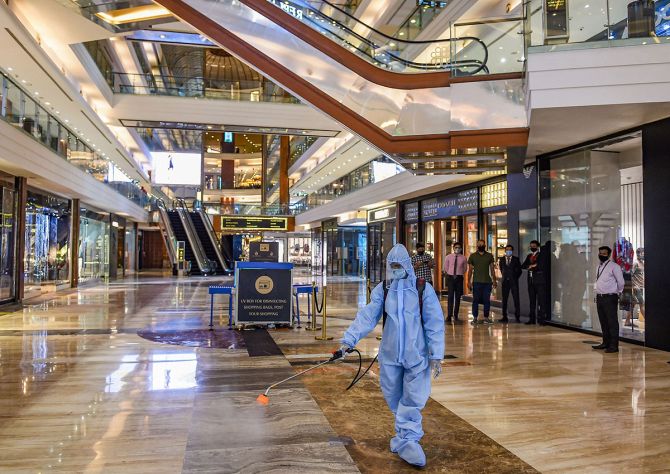'When you don't have food to eat, will you be worried about the virus or the next meal?'

During the lockdown, Genius Consultants Ltd, a Rs 1.2 billion plus staffing company with 400 plus employees and over 50,000 associates, conducted a survey among employees of various firms who have started functioning on what they think about the Indian economy.
Interestingly, more than 50% expected the economy to recover from the effects of the lockdown in 6 to 8 months. Only 14% of the participants found the lockdown unavoidable.
"The moment the vaccine comes, rejuvenation in the economic situation will start," Rajendra Prasad Yadav, below, the founder of Genius Consultants, tells Shobha Warrier/Rediff.com.
What prompted you to conduct a survey among employees on what their expectations are of the economy?
We did this survey to know the perspective of both employees and employer. More so of the employees as today all employees face an uncertain future.
They do not know whether they will have the job tomorrow, whether they will get their salary, whether there will be a pay cut...
While economists see a grim future, the employees seem to be more optimistic about the economy...
I would say when we did the survey in April, the mood was totally different.
The situation is such that the economic scenario changes every day.
In April, nobody thought cinema halls would not open in the near future. We did not think then that every sector from tourism to transport would be affected so severely.
If you had asked me in May about the future economic scenario, I would have painted a more optimistic picture.
I will give you an example. We have more than 50,000 people working for us, and like the government wanted, we paid full salaries to all of them in April and May.
When the issue went to the high court and Supreme Court, the court specifically said it was between the employee and the employer, and the government could not force any employer to pay salaries.
That's how the situation has changed.
Only 14% of employees felt that the lockdown was unavoidable...
Today, everybody wants the lockdown to go.
Almost 38 crore people in India are working in the informal sector which include drivers, domestic workers, barbers, agriculture labourers, etc, and they were very badly affected.
You take the daily wage earners like the domestic workers. There are 20 million domestic workers in India. You will be shocked to know that only 20% of the domestic workers got their salaries in April and May.
There are 30 lakh barber shops in India, and at least two people work in each of these barber shops.
Today, 90% of the people in India will say, 'let's do away with the lockdown. It is a question of livelihood versus the virus.
When you don't have food to eat, will you be worried about the virus or the next meal?
You have been running your staffing company for almost three decades. From your experience, which sector is the most affected?
Tourism, aviation and the entertainment sectors are completely devastated.
The fact is, not a single sector except for the virtual aggregators and e-commerce can today say, they are not affected. All of them are affected anything between 20% and 80%.
The first quarter results of most companies are out, and you can see how they are performing.
For example, the revenue of a firm like Nestle which sold Maggie like hot cakes during the lockdown, is just up by 1.96%.
A recent report said that the top four IT firms in India -- TCS, Infosys, Wipro and HCL -- dropped their headcount by around 10,000 for the first time in a decade.
IT companies are one of the largest employers in India. All the IT majors in India are largely dependent on the US and European market. For almost four months, the US market is almost closed. Europe also was seriously affected.
So, from where are these IT companies going to get business?
When their business is affected, obviously that will affect the contract employees who are working on project basis. Thus, many people lost their jobs.
As we do the payroll of so many companies, we know that in every company, there was a drop of 5% to 25% in the employee count. In fact, there was a drop in the number of permanent employees also.
Which segment is losing jobs? The middle level employees?
The largest lay off in any company will be the front-line workers because of the number.
For example, during this lockdown, those who were affected the maximum were the blue-collar workers and those in the factory operations.
During the lockdown, factories were closed. Now they are opening only with 30% capacity though the government norm is 50%. But most factories have to work with 30% employees because of the layout of the factory.
In our office in Kolkata, we can have only 20% of the employees, but we do not have even 20% of our employees coming to office as so many of them are in the containment zone. So, we may have only 15% of our employees in the office.
Because people are not coming to work, you lose business.
When you lose business, you have to reduce the expenses, and the first causality will be the front-line workers.
The next group that will be affected are the middle level employees.
We see that the senior level people are not that affected because they are few in number, and they have more experience. No company likes to remove the leadership positions.
This is how a company works not just in India, but all over the world.
So, the employees are under tremendous stress. They are fearful about not only losing the job, but a pay cut too. They can also become a furlough. Furlough means you are on the rolls of the company, but do not get a salary.
Will it take a very long time for any company to look for new employees?
There used to be a demand for new employment every year, which was around 10% to 20%. Now it has come down to 1% to 2%.
There was hardly any new recruitment in April, May and June.
Only the virtual aggregators and e-commerce companies are asking for people. Companies like Amazon, Google and Paytm require people now. They are a very small fraction of companies when you look at the size of India.
So, I would say there is hardly any new recruitment. It is on halt.
We are doing some recruitments, but they are for replacement positions only.
How do you compare the current economic situation to what happened in 2008 when there was a global economic meltdown, and many people lost money and jobs?
In 2008, what we experienced was an economic slowdown. Everybody knew that it was temporary, and things would turn around soon.
 India was not affected much in 2008 though many other countries were badly affected.
India was not affected much in 2008 though many other countries were badly affected.
But this pandemic has created havoc in every country in the world, and every industry.
The Spanish Flu of the 1920s affected only Europe. The World Wars were fought between only 30, 35 countries, but the coronavirus has affected all 236 countries.
In my opinion, this is the worst economic crisis the world has ever seen.
Above all, there is total uncertainty. We do not know what will happen tomorrow.
When do you see the economic situation changing?
When the vaccine comes to the market.
I think it will be available only by the first quarter of next year. We have to also understand that there are 6 billion people in the world, and all of them need the vaccine. It will take 1 to 2 years to make this vaccine available to everyone.
I feel the moment the vaccine comes, rejuvenation in the economic situation will start. In fact, the rejuvenation has already started on a small scale.
The unemployment rate has come down from 26% during the lockdown to 8.5% now.
I would say the Indian economy has started limping, and by 2021-2022, it will come to around 80% to 90% of what it was before the pandemic.
Once the vaccine arrives, the psychological barrier will go. People will not be that afraid to come out.
With that barrier gone, people will start taking risks, factories will start taking risks.
People will take risks only when they know that there is a remedy available.
So, the risk-taking ability of the individual will start from the moment the vaccine comes.
From which sector do you see the green shoots coming?
At the moment, people want only health and essential items.
So, I see the green shoots coming from the pharma sector.
Then comes the consumer products. By consumer products, I mean food items, cosmetics, and other everyday items.
I also see more and more people buying two wheelers and bicycles as they would prefer using them than using public transport. There will be a huge demand cycles and scooters across the world.
What will happen to the MSME sector which accounts for 80% of India's businesses and is very badly affected right now?
The ground reality is that the most affected sector in India is the MSME sector. We have around 60 million MSMEs and out of the 380 million jobs generated in the informal sector,
MSMEs provide 120 million jobs. So, when they get affected, unemployment also will rise.
You should also understand that the MSMEs are the ones that support the larger companies as suppliers. What are the large companies doing?
They are producing very little compared to their capacity and that's why the MSME sector is struggling.
So, even if the government reduces the interest rate or increases the credit, if there are no orders, they will continue to struggle.
As a person who runs a company that has employed more than 50,000 people, are you optimistic about the Indian economy?
I am optimistic. That's because the pandemic has only put a halt in the economy; it did not create an erosion.
When something is halted, we can restart any time, but when an erosion happens, it will be a difficult process.
Unlike during the World Wars, factories were not bombarded or destroyed. At that time, everything had to be rebuilt but today, factories are there, offices are there; we have to only restart them.











 © 2025
© 2025